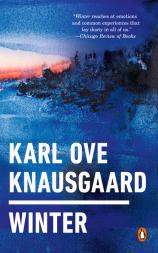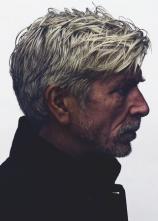Winter
Review
Winter
From a writer best known for his massive, multivolume novel, MY STRUGGLE, the idea of a parallel collection of short personal essays might at first seem incongruous. But now that Norwegian writer Karl Ove Knausgaard has published WINTER, the second installment of his seasonal quartet of such collections, he has shown an engaging facility for this shorter form that makes its pieces, ranging over much of human experience, a consistent pleasure to read.
In the first "Letter to an Unborn Daughter," in AUTUMN, Knausgaard expressed to what will become his fourth child his desire to "show you our world as it is now: the door, the floor, the water tap and the sink, the garden chair close to the wall beneath the kitchen window, the sun, the water, the trees." Now, as his wife Linda's pregnancy enters its final trimester, as 2013 moves into 2014, he concedes, in the first of three more such letters in WINTER, that it's "strange you exist but you don't know anything about what the world looks like." He seems similarly determined here to illuminate life, in all its absurdity and grace, to this soon-to-arrive child.
"In this latest book, the range of Knausgaard's interests remains no less diverse, while his ability to expound concisely on a single topic in three pages or so is equally impressive."
In this latest book, the range of Knausgaard's interests remains no less diverse, while his ability to expound concisely on a single topic in three pages or so is equally impressive. In the 60 pieces comprising WINTER, Knausgaard again is an acute observer of the natural world and the dynamics of domesticity. The essays are not linked in any way, with "Q-Tips" and “Roosters," "Sex" and "Snowdrifts" as February companions, bracketed by musings on everything from body parts to the moon. It appears that something randomly snags Knausgaard's eye, imagination or memory and he feels compelled to write about it, so it's impossible to sum up neatly the breadth of these pieces.
As would be expected from a Scandinavian writer's book centered on the season most people associate with that part of the world, there are frequent references to snow and ice. That doesn't necessarily make Knausgaard an admirer of wintry weather. For him, winter, the "cheap conjurer" that turns water into ice, is "rather like a tattered, slightly drunken circus ringmaster travelling around with his trailers and campers, providing people with diversion, a few hours when they could gasp in astonishment and shake their heads in admiration, while there really wasn't anything to be astonished at or to admire." But for all that dismissiveness, there's at least a grudging recognition of the season's beauty in his description, for example, of a snow-covered forest whose silence "seems to grow denser, more concentrated, and that sound, which is no sound, only a nuance of silence, a kind of intensifying or deepening of it, is the sonic expression of winter's essence."
Along with Knausgaard's gift for word portraits like these, one of the great pleasures of his essays is his consistent ability to pivot from some quotidian observation to open onto a larger truth. In "Christmas Presents," for example, he describes the last-minute purchase and wrapping of his children's gifts, and how, when they are unwrapped the next day, a robot or rabbit "will be given names and traits and be included as equal members of their world." In much the same way, he writes, the ability to "give life to the lifeless, to create a world where that which is closed opens itself to us, is ennobled in literature." "The Local" begins with some observations about a landscape that "glittered as if strewn with precious stones" after an overnight freeze and concludes with musings about the vastness of the universe and our curious place in it.
Whether he's writing about the way the disarray of his own house "bothers me, not intensely, but steadily and quietly," or of his children's toothcleaning ritual (which apparently involves sharing their toothbrushes), Knausgaard is a slightly bemused witness to his family's life. He admits to some unease when he tries to "observe our life here with the gaze of the child protection service or the social welfare office," but there never seems to be much more than the normal chaos attendant to a house with three children ages nine and younger.
Every child should be as fortunate as Knausgaard's daughter will be some day to have stories like these to usher them into the world. But since few will be that lucky, they and their parents might want to savor WINTER and its seasonal companions instead.
Reviewed by Harvey Freedenberg on January 26, 2018
Winter
- Publication Date: November 5, 2019
- Genres: Memoir, Nonfiction
- Paperback: 272 pages
- Publisher: Penguin Books
- ISBN-10: 0399563350
- ISBN-13: 9780399563355




